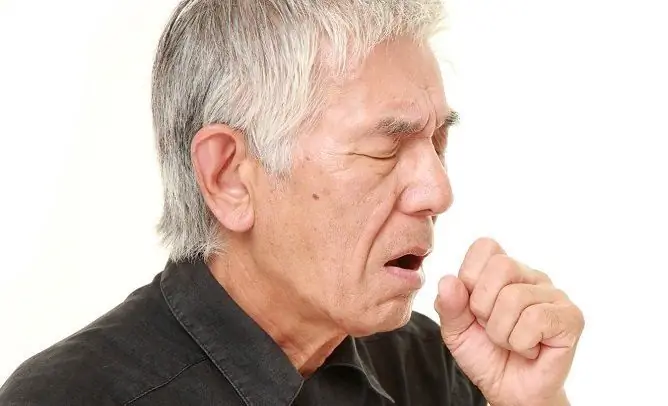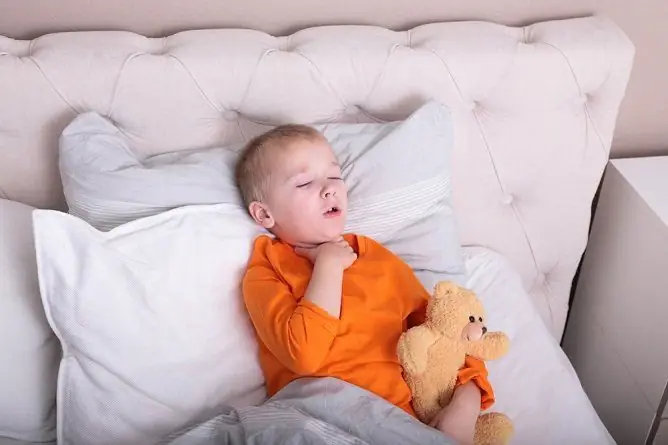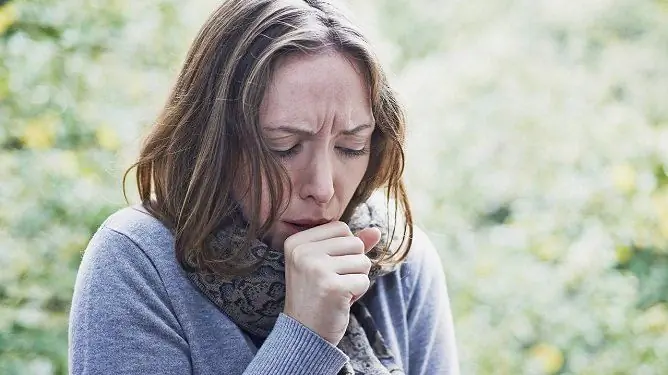- Author Rachel Wainwright wainwright@abchealthonline.com.
- Public 2023-12-15 07:39.
- Last modified 2025-11-02 20:14.
Cough at night in adults: causes, signs, treatment
The content of the article:
- Why does an adult have a cough at night?
- How does a cough at night manifest, accompanying signs
- What to do with a nocturnal cough in adults
- Folk remedies used for night cough in adults
- Video
The reasons for coughing at night in adults can be physiological, but this symptom can also be observed in a number of diseases of the respiratory and other systems of the human body.
Nocturnal cough in adults is different. So, for a dry cough, swelling and inflammation of the larynx, the appearance of spasms, a wet cough indicates an inflammatory process, with a barking cough, swelling of the vocal cords is observed, the patient's voice becomes hoarse. A lingering cough that develops in the morning may indicate inflammation in the nasopharynx, a deaf cough may occur with beginning bronchitis or pulmonary emphysema, etc.

A night cough does not necessarily indicate an illness, you should only worry when it takes on a stubborn character
During a night's sleep, when a person is in a horizontal position for a long time, sputum removal is difficult, so the cough at this time can be longer and persistent than during the day. Such a cough disrupts sleep and causes a deterioration in the patient's general condition.
Before starting treatment for a cough that occurs at night, you need to establish the cause of its occurrence.
Why does an adult have a cough at night?
Cough is not always a symptom of a particular pathological process. Several coughs per day are normal, including they can occur after sleep, when a person changes the horizontal position of the body to vertical.
A persistent cough at night usually develops in acute respiratory viral infections, inflammatory diseases of the upper and lower respiratory tract. Such a cough at night can appear with tuberculosis, whooping cough in an adult, pneumothorax, bronchial asthma. This symptom can occur if the patient has neoplasms, disorders of the gastrointestinal tract (gastroesophageal reflux disease), cardiovascular system, and may have psychosomatic causes.
A cough can occur at night when the air is too warm, cold and / or dry in the room where the person sleeps. In addition, it can be caused by inhalation of dust, vapors from household chemicals, cosmetics, as well as the development of an allergic reaction, for example, to the pillow filler. In this case, the cough is dry, it goes away on its own when contact with the irritant is eliminated.
Coughing at night often bothers experienced smokers.
This symptom can develop when a foreign body enters the respiratory tract of a person.
How does a cough at night manifest, accompanying signs
In acute respiratory viral infections, in addition to coughing at night, patients also have discharge from the nasal cavity, an increase in body temperature, and sneezing.
With tracheitis, pericarditis and neoplasms of the pleura, the patient, in addition to coughing, may experience pain in the chest and / or in the side.
Laryngitis cough often develops at night, the attack may end in vomiting. With pharyngitis, a nocturnal cough may be accompanied by a sore throat, an increase in regional (submandibular) lymph nodes.
With pneumonia, coughing may bother the patient at night, and the patient may also have chest and / or spinal pain. The phlegm that separates when coughing is often purulent.
With pneumothorax and the inflammation that has developed against its background, in addition to a nocturnal cough, pain in the chest and in the back occurs (approximately at the same level).
In patients with tuberculosis, a nocturnal cough is accompanied by a worsening of the general condition - lethargy, increased fatigue, pallor of the skin, increased sweating at night, weight loss, hemoptysis appear.

With pulmonary tuberculosis, cough is often accompanied by hemoptysis
A tearful cough can develop at night in patients with a neoplasm in the respiratory tract. With such pathologies, blood impurities can be found in the sputum.
In the case of whooping cough, a dry cough at night has the appearance of prolonged attacks, accompanied by nausea, vomiting, choking and wheezing.
Nocturnal coughing attacks in adult patients with bronchial asthma are also accompanied by wheezing, a feeling of heaviness in the chest, and suffocation.
In diseases of the cardiovascular system, coughing at night is accompanied by shortness of breath, palpitations. In the daytime (in an upright position of the body), the cough usually does not appear.
The cough in people who smoke a lot is worse in the morning. At the same time, it is difficult for a person to cough up thick phlegm.
If a foreign body enters the respiratory tract, coughing occurs suddenly, a cough attack is strong and prolonged, accompanied by suffocation, cyanosis of the nasolabial triangle.
What to do with a nocturnal cough in adults
With a strong, excruciating dry cough caused by any pathology of the respiratory tract, in the absence of mucus accumulations in the respiratory tract, the patient may be prescribed cough suppressants. A dry cough can also be tried with steam inhalation. The advantages of this type of procedure are ease of implementation and availability, since it is not possible to purchase special devices for its implementation. The patient can breathe in steam over a container with a solution by throwing a towel over his head.
With a wet cough, expectorant and mucolytic drugs are used to thin the sputum and facilitate its removal from the body. In the presence of bronchospasm, bronchodilator drugs are indicated, which relieve spasm and expand the lumen of the bronchi. To facilitate the excretion of sputum, the patient can be prescribed physiotherapy procedures, massage.
For infectious diseases, depending on the type of pathogen, antibacterial, antiviral, antifungal agents can be used.
When a cough appears at night due to diseases of the respiratory tract, the patient is advised to drink plenty of warm drinks. It is recommended to drink tea with lemon, herbal teas (can be used with honey or raspberry jam), warm mineral water, juices, fruit drinks, compotes.
If there is a tendency to cough at night, the patient should place the sleeping place in such a way that the head and chest are in a slightly elevated position. It is recommended to humidify the air in the room where the patient is.
In case of an allergic cough, it is necessary, first of all, to eliminate the allergen, in addition, antihistamines are prescribed.
If a foreign body enters the respiratory tract, immediate hospitalization is required. Surgery may be required to retrieve the item.
Folk remedies used for night cough in adults
Folk remedies, just like any other methods of treating cough, must be agreed with your doctor. Their use is possible if the cause of the disease is precisely known, otherwise the result may be opposite to the expected one.
For coughs at night caused by an infectious airway inflammation, you can use a mixture of lemon juice, honey, and glycerin (in equal amounts). The product is consumed in 1 teaspoon.
With pharyngitis and laryngitis, you can drink milk with sage. To prepare it, a tablespoon of dry grass is poured with a glass of boiling water, insisted for 20-30 minutes, filtered and mixed with a glass of milk. Warm sage milk is consumed before bedtime. You can add a little honey, a teaspoon of butter to it.
For bronchitis, infusions and decoctions of oregano, coltsfoot, wild rosemary, licorice root, sage can be used.

Traditional medicine is good for coughs caused by airway inflammation.
In case of respiratory diseases, an infusion of pine buds can be used, for the preparation of which 1 tablespoon of the kidneys is poured with 1 glass of boiling water, insisted for about 1 hour and filtered. With the development of an attack, drink 1-2 sips of the heated infusion.
For colds, you can drink warm milk with soda (with a strong cough, take 0.5 teaspoon of soda per glass of milk) or with mineral water in a 1: 1 ratio.
Honey cakes are helpful against the nocturnal cough caused by bronchitis. For their preparation, mix in equal proportions flour, honey and water, adding a little vegetable oil. A cake is formed from the mixture and placed on the patient's chest and / or back, fixing it with a scarf. The cake can be left overnight. When treating a child, warming compresses are placed either on the chest or on the back in one procedure. Warming compresses are not used at elevated temperatures.
Video
We offer for viewing a video on the topic of the article.

Anna Aksenova Medical journalist About the author
Education: 2004-2007 "First Kiev Medical College" specialty "Laboratory Diagnostics".
Found a mistake in the text? Select it and press Ctrl + Enter.






